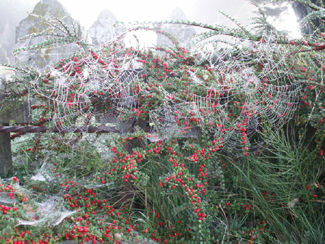Common Garden Spider
Araneus Diadematus
This is the time of year when spiders seem to be very noticeable, whether by their dewy early morning webs or the vision of them scuttling around our bedrooms and bath tubs!
On our Ryde cemetery nature walk last September we saw lots of spiders and their webs. We found a pair involved in a prancing courtship and watched for several minutes as the larger female looked ready to attack whilst the smaller one kept trying to get close but then made a rapid retreat.
In most species of spider the male has to escape quickly after mating or the predatory female will eat him, except where the male is so much smaller that he is not worth the bother! Like other arthropods, spiders have to molt to grow and in some species the clever males mate with newly-molted females, which are too weak to be dangerous. As well as eating their mates spiders also like to eat their webs. Constructing a web is an energetically costly process due to the large amount of protein required, in the form of silk. It is not uncommon for spiders to eat their own web daily to recoup some of the silk proteins.
(Info on spiders from Wikipedia)



